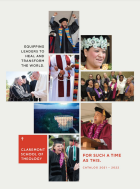What does it mean to be human? The answers are often packaged in psychological, sociological, biological and emotional language. Yet all too often the spiritual component is left out. Call it a shortcoming of modernity. The Spiritually Integrated Psychotherapy track brings theology and religion back into conversation with the biggest questions and concerns of human existence. It is a counseling model that is deep without being dogmatic.
In congregations, agencies and other settings, this track is preparation for pastoral care and counseling informed by Christian history, ethics and religious texts in context. Together with classes in spiritual care, interreligious dialogue and systematic theology, students are prepared for additional coursework in clinical education. And finally, a clinical case study fulfills the MA requirement for a probing summative exercise.
PLEASE NOTE: Students who are on a license track in the US may be able to receive a certification in Spiritually Integrated Psychotherapy through the Association of Clinical Pastoral Education. The master’s or doctoral degree which CST currently offers does not render students the eligibility to become licensed mental health providers in California.
Spiritually Integrated Psychotherapy Curriculum:
Core Courses – 21 credits
First Year Requirements:
TSC3004 Theories and Practices of Spiritual Care (3 credits)
Clinical Education – see specific requirements below (6 credits)
TIR3001 Interreligious Dialogue and Leadership (3 credits)
Second Year Requirements:
Clinical Education – see specific requirements below (6 credits)
Elective in Interreligious Studies (3 credits)
Theological/Religious Studies – 15 credits*
THC3007 History of World Christianities (3 credits)
TEC3001 Introduction to Christian Ethics (3 credits)
THB3007 The Hebrew Bible in Context: An Introduction (3 credits)
TNT3003 The New Testament in Context: An Introduction (3 credits)
TTH3036 Systematic Theology (3 credits)
*Substitutions for Non-Christian Students:
Course in History of a particular Religion (3 credits)
Course in Ethics (3 credits)
Course in Theology or Philosophy (3 credits)
Course in Scripture/Sacred Texts (3 credits)
Course in History, Ethics, Theology/Philosophy or Scripture/Sacred Texts (3 credits)
Electives – 12 credits
Courses in discipline, as approved by advisor
Summative Exercise – 0 credits
Students in this concentration normally complete a clinical case study to fulfill the summative exercise.
Clinical Education Requirements
Clinical Pastoral Education Prerequisite
Successful completion of one unit of CPE with an evaluation acceptable to the faculty in the field of spiritual care, is required before students may begin their clinical training. Students who do not have this prerequisite will not be able to complete the degree in two years.
Additional Costs
Supervision Fees: Due to the high cost of supervision and other training expenses, additional fees are charged for TSC3041, TSC3042, TSC3044, and TSC3045. The amount of these fees is indicated in the registration materials for each semester. These fees are normally not covered by scholarship, but can be included in the overall financial aid package. The fee for the current academic year is $1,500 per semester, excluding the summer term.
Required Training Psychotherapy: The effective and ethical practice of spiritually integrative counseling depends upon the caregiver’s continual cultivation of emotional and spiritual resources, self-knowledge, and ability to use themselves for the care of others. Therefore, students concentrating in Spiritually Integrated Psychotherapy are required to be in at least one year of weekly psychotherapy at their own expense during their clinical education. Students indicate that they have begun this requirement by requesting that a letter be sent by their therapist to the CST faculty clinical program director indicating that the psychotherapy has begun.
Registering for Clinical Courses
A total of 12 credits are required and students register for the course Spiritually Integrative Counseling Internship, as follows:
TSC3041 (Fall, 1st year) (CPE prerequisite) 3 credits
TSC3042 (Spring, 1st year) 3 credits
TSC3043 (Summer, 1st year) 0 credits
TSC3044 (Fall, 2nd year) 3 credits
TSC3045 (Spring, 2nd year) 3 credits
TSC3046 (Summer, 2nd year, unless graduating) 0 credits
Want to learn more?
Reach out to the Admissions Counselor for this program, Karen Gonzalez, by emailing kgonzalez@cst.edu or by using the below link to submit an inquiry form.



